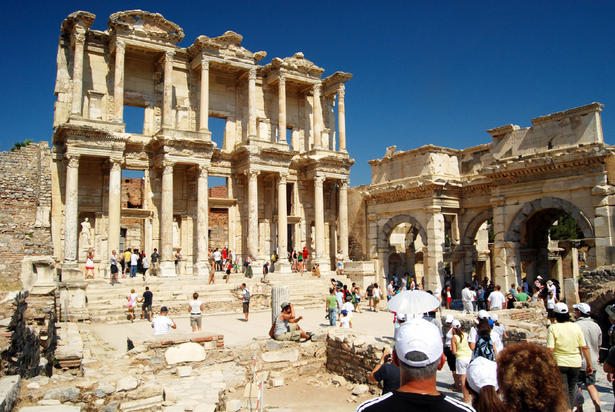As it gets more expensive to travel, governments in Europe are stepping up to help out families with travel vouchers.

The ancient site of Ephesus is three kilometres outside of Izmir, a hot destination for Turks but not so much for international travellers.
Ever since Englishman Thomas Cook started selling package tours to working women and men in the 1840s, travel has been more about taking a break than indulging in privileged leisure. But it’s only recently that some governments have been seeing it as a social good, and one that deserves their support.
Belgium, Finland, France and Spain all offer one form or another of holiday vouchers to seniors, people with health problems and families who otherwise couldn’t afford to get away. This month, the United Kingdom starting taking the idea seriously, too.
Known as social tourism, the idea is based on an understanding that there is a positive social good associated with vacations and that, like health care, it’s more of a right than a luxury. According to the Family Holiday Association, a travel industry-supported charity in the U.K., France’s scheme helped seven million families travel in 2010.
A parliamentary group, headed by the MP for Blackpool, where Cook took some of his first working-class tourists, will be submitting a report to the U.K. government in July.
With opposition leader Jack Layton in Stornoway, could social travel soon be finding its way onto the Canadian agenda?
A NEW TURKISH DELIGHT?
The Turkish tourism folks are turning up the steam on Izmir.
Thanks to the Four Lads, we know that Istanbul used to be Constantinople. But until a couple of weeks ago, I had no idea that Izmir used to be Smyrna, Homer’s hometown.
Izmir, Turkey’s third-largest city with a population of almost 4 million, is on the Aegean Sea and has been a tourist spot for Turks and Greeks for years. But of the 27 million people who visited Turkey in 2010, only about 1 million came to Izmir.
Last week, Turkey decided to try to turn that around, bringing in more than 60 journalists from 26 countries for three or four days to take a look around.
It’s no Istanbul, but then, going to Istanbul and saying you’ve seen Turkey is like going to Paris and saying you’ve seen France. Though mayor Aziz Kokaoglu and tourism officials seem to want to sell it as a European metropolis, Izmir’s main selling point is probably just how Turkish it is. Folks haven’t gotten around to learning English for the tourists yet, and everything from the early-morning waterfront tables in the Kordon district to the 1901 clock tower in Konak Square is there for people who read Orhan Pamuk in the original.
The tourism plan, which coincides with last year’s introduction of the first direct flight from Toronto to Istanbul on Turkish Airlines, will be rolling out over the next year or so, and Izmir hopes to be competitive with Istanbul within the decade. But you might want to drop in before that, while it’s still mostly itself.
TOP BOUTIQUE HOTELS UNDER $200
In North America and much of Europe, boutique hotels have become known for extraordinary attention to design, and their higher-than-average price tags. But though the concept’s caught on in the rest of the world, according to TripAdvisor’s readers, the cost has not.
Last week, the user-review website compiled its list of the top 10 boutique hotels under $200, six of which were in Asia. Malaysiam (the Lone Pine in Batu Ferringhi), Thailand (U Chiang Mai), India (Royal Heritage Haveli in Jaipur), Cambodia (La Maison d’Angkor in Siem Reap) and China (Hong Kong’s Butterly on Wellington) were all on the list, and though the Hotel du Cadran Tour Eiffel in Paris and The Hide in London made the list, it was topped by Vietnam’s Hanoi Elegance Diamond Hotel, which opened a year ago this month in the city’s old quarter.
TAKE A RUN WITH THE GM
There are four Fairmonts in Vancouver: the classic, the sophisticate, the airport and the Waterfront, which is increasingly becoming the go-to Fairmont for people who prefer to do their relaxing in motion.
This month, that property introduced a new fitness program that includes rooftop yoga, loaner workout gear and morning runs with the general manager.
Some of the more boutique sunspot resorts, like Petit St. Vincent and Jamaica’s venerable Round Hill, have long offered weekly owner and manager cocktail evenings where otherwise secluded guests get to mingle and tipple. But Vancouver attracts the sort of crowd more likely to be gulping protein shakes than sipping Gibsons. So these runs seem perfect. Led by GM Ian Pullan, a marathoner himself, the standard route is about 5 kilometres along the Stanley Park seawall every Tuesday and Thursday morning at 6:30. Rain or shine, of course.
FUEL SURCHARGES KEEPING YOU AT HOME?
According to the latest report from the International Air Transport Association (IATA), air travel in economy class was down significantly in March over the previous year, and has been declining steadily for the past five months. IATA says it can be mostly attributed to the $40 per barrel increase in the cost of fuel over the same period a year ago, a cost that airlines have been trying to recoup with higher fares and surcharges.
Though what the industry calls premium travel—people flying in business or first class—is also down, according to the report, which says, “The decline of economy travel over the past five months is more of a concern than the recent fall in premium passenger numbers.” And it’s easy to see why. Though premium travellers bring in a lot of dough, there are 10 times more economy passengers, and if they stop flying it’s a real problem. Flights get cancelled, routes get cut, airlines go out of business.
And those numbers came out before Grimsvötn erupted.
Bert Archer is the Toronto Star’s travel news columnist. His column runs every Thursday; [email protected]; Twitter: @BertArcher.
